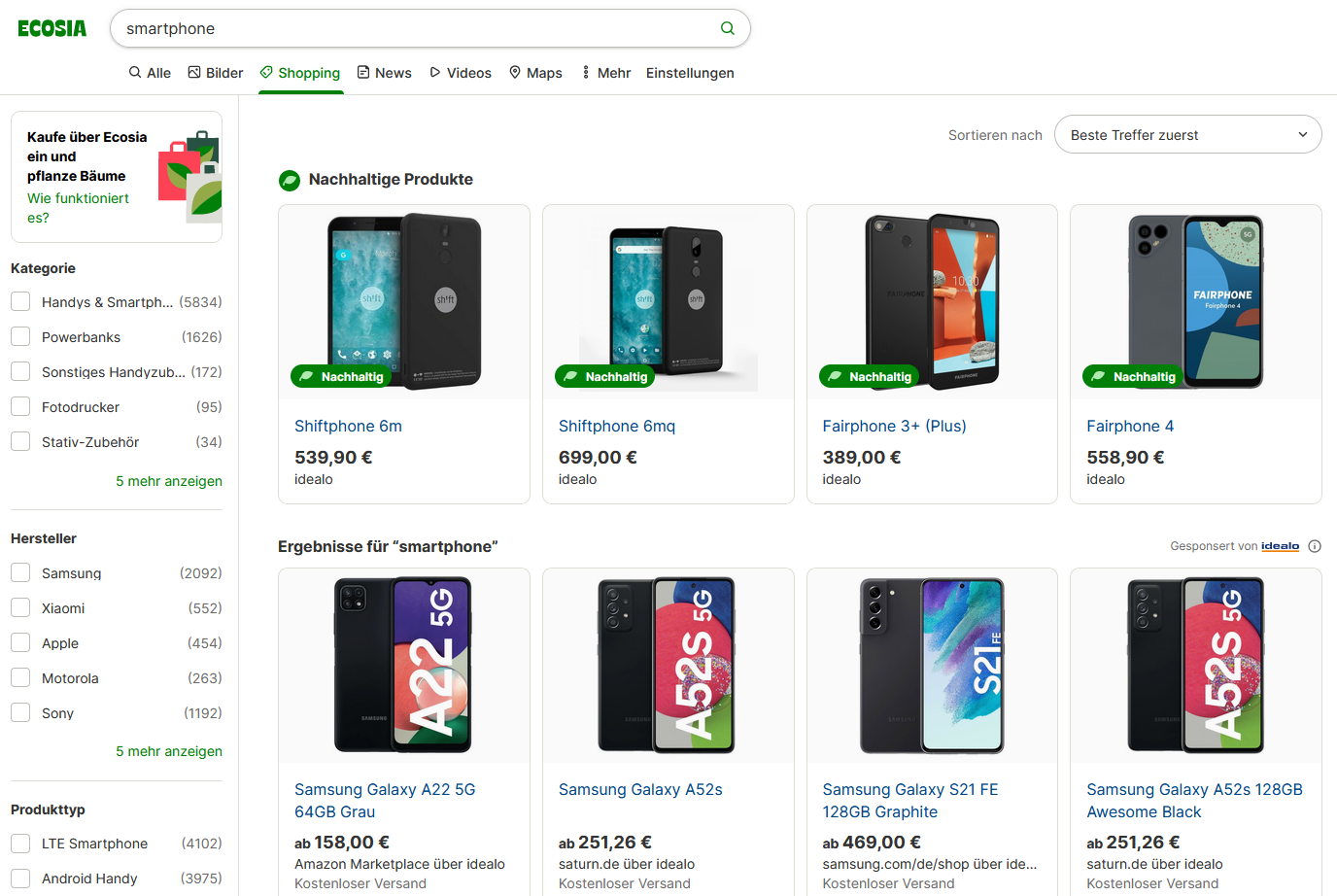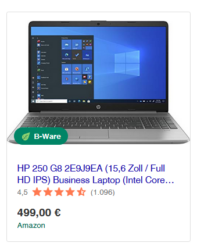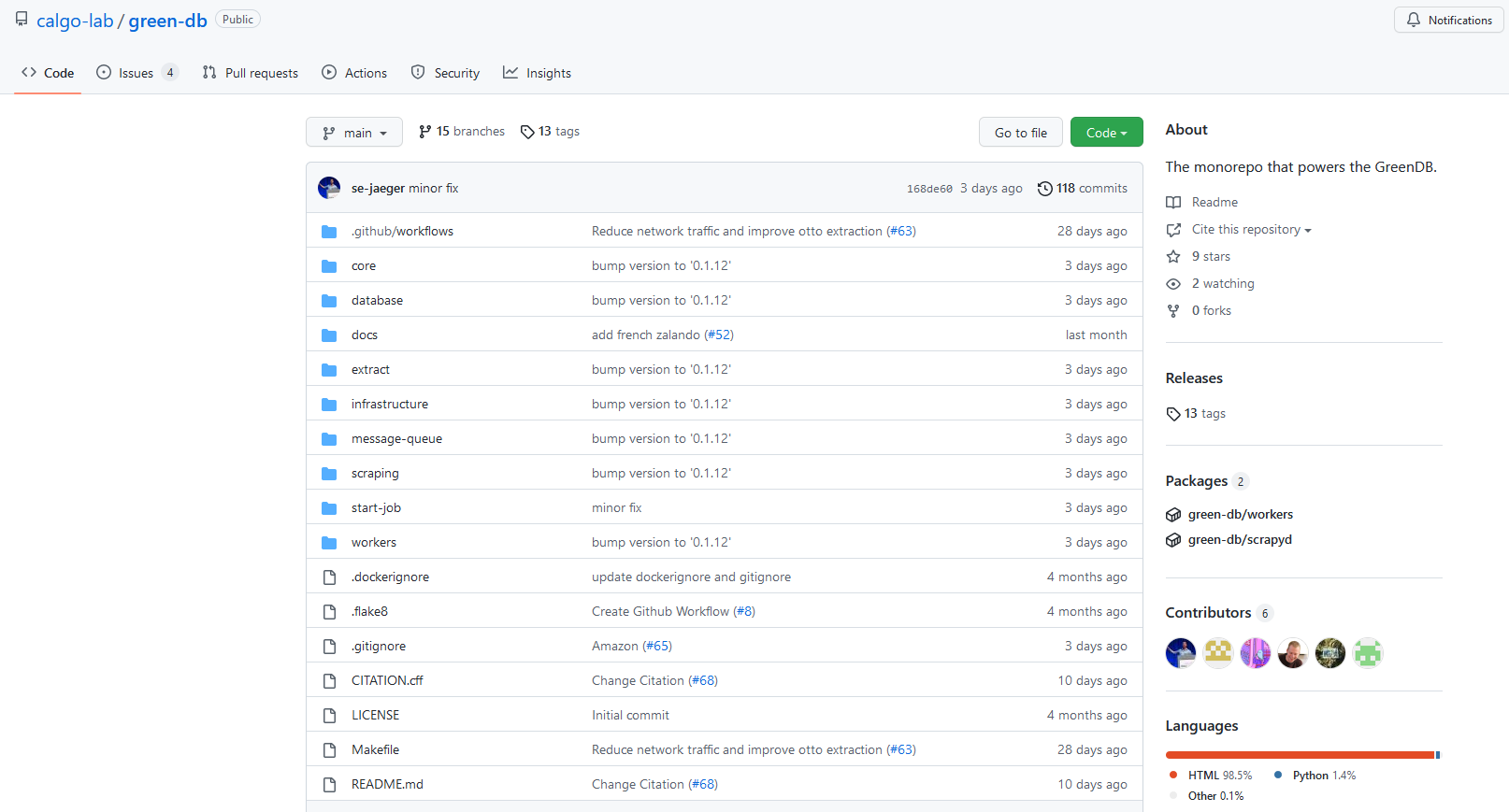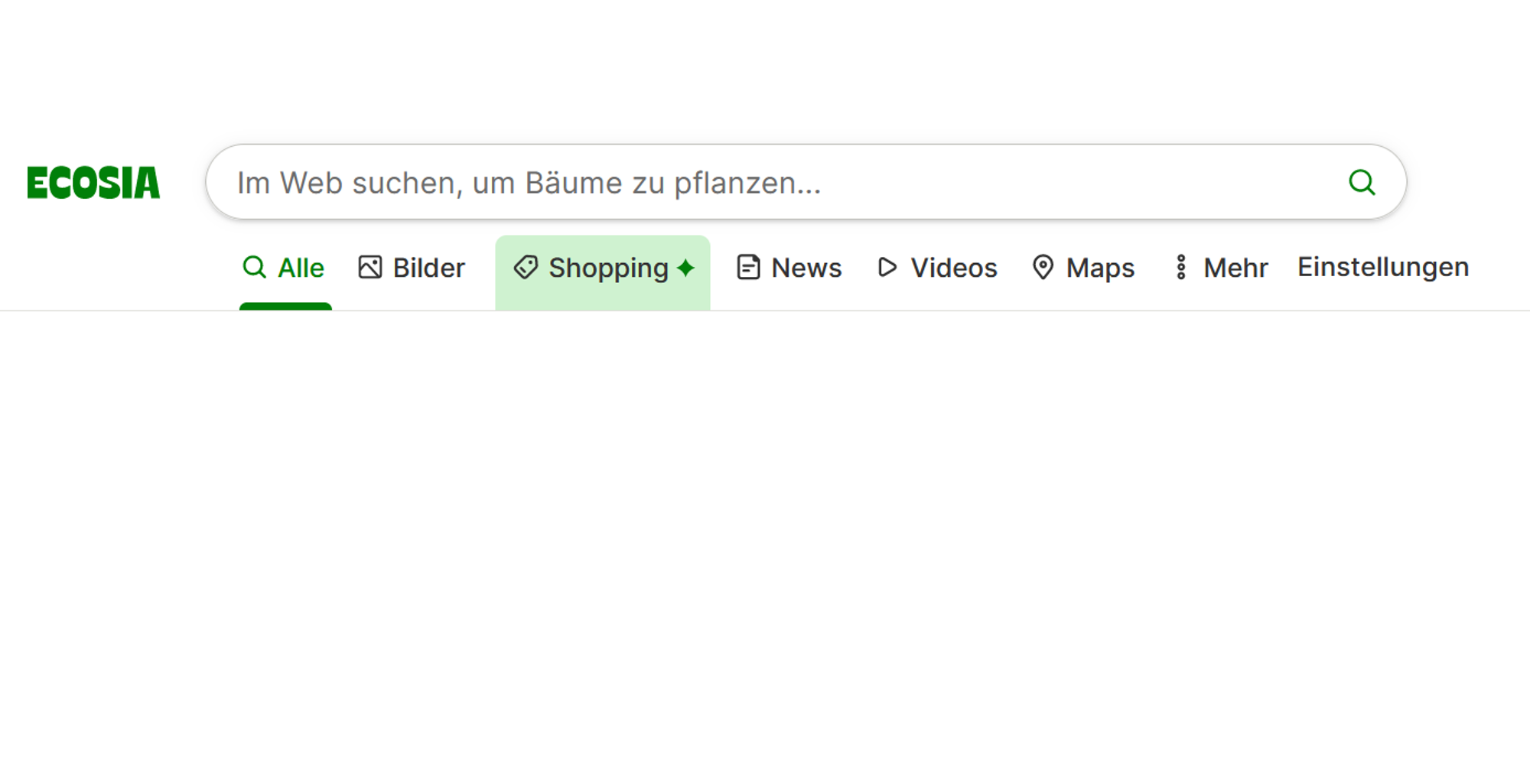Many things happened in the last few months. A quick overview:
- The work on the Chrome browser extension „Koala” was completed.
The Green Consumption Assistant search technology is now integrated into the shopping page of Ecosia. - The Green Database – a database of sustainable product information – has been implemented and is expanding steadily.
Bye bye, Koala!
The „Koala” was a Chrome browser extension that we developed as part of the Green Consumption Assistant and tested in different beta versions. With the help of an algorithm, it could identify queries and conclude when and what users would like to shop online. According to these individual interests, it displayed pop-ups with more sustainable alternatives.
As a result of the analyses of user data and user tests, further work on the Koala has been stopped now. The browser extension is not available anymore. You can find more information about the Koala in one of our working papers or Product Update I and Product Update II on this website.
Admittedly, we are including the best functionalities in our next features. Earlier this year, the features tested in Koala started to be integrated into the Ecosia search engine environment. Ecosia has 20 million active users and can help people make more sustainable choices in their everyday lives.
This is how sustainable shopping is possible in Ecosia
The algorithm, successfully tested in the browser extension, identifies what users are interested in using Ecosia’s web search. Using the newly developed shopping function, sustainable products can be discovered quickly and easily. For this purpose, a selection of sustainable products is automatically displayed at the top of the shopping page with just one click.
How sustainable product recommendations can be identified
It is almost impossible to keep track of the multitude of sustainability labels. Some people don’t know what the labels „Blue Angel”, „TCO” or „Energy Star” stand for and what criteria they apply. To help users understand at first sight which products are recommended as sustainable, they are marked with an understandable banner „Sustainable” and a leaf symbol on the product images. This is what it looks like:

© privat
Figure 1: Screenshot of online-shopping and searching „Jeans Herren” in Ecosia. Sustainable products are marked with the
banner „Sustainable” and are prominently displayed in the results list.
Furthermore, used products are marked with the green banners „B-Ware” and „Refurbished” in the other search results:

© privat
Figure 2: Used products are marked with the banners „B-Ware” and „Refurbished” in the results list.
Ecosia Shopping is:
- Relevant: Ecosia’s shopping function uses technology that allows users to find sustainable products easily and links to the relevant online shops directly.
- Clear: Users can find a variety of sustainable products at first view. They are displayed prominently above the usual search results and are marked with a simple banner.
- Fast: Immediately after a search query is entered, photos, product features, and links to the online shops are displayed.
The product suggestions are linked closely to the further development of our AI-powered Green Database, from which the recommendations are automatically retrieved.
Further development of the Green Database
The public Green Database contains besides classical product attributes like name, brand, description, colour, etc. additional information about the sustainability of products. With this database, Ecosia’s shopping function is provided with sustainable product recommendations.
The database is getting bigger
The Green Database has already grown to 220,000 products from the clothing and electronics sectors in a total of 3 countries (Germany, France, UK in May 2022). All products that are machine-read into the database are automatically evaluated regarding their sustainability information.
This is how the sustainability database works
any online shops display sustainability information next to their products and have sustainability filters. We use scraping technologies to automatically find sustainable products in these online shops and integrate them into the Green Database. In addition, we rate products along a series of three dimensions (social performance, environmental performance, and credibility) on a scale from 0 to 100, meaning that a product with a high score is the more sustainable choice compared to a product with a low score.
It is not effective to evaluate individual products manually. Therefore, we use the possibility of evaluating products automatically with the help of sustainability labels. The platforms Siegelklarheit and Label Online analyse a large number of these sustainability labels systematically and make their results public and transparent. We will use these evaluations to infer the sustainability of a product if it is certified with a sustainability label.
The Green Database is:
- Powerful: we use scraping technology that allows products labelled as sustainable to be added to the database automatically from the pages of various online shops.
- Comprehensive: The database lists both common and uncommon products.
Fast: Immediately after entering a search term, relevant products are called up from the database and displayed in the search results of Ecosia’s shopping page. - Up-to-date: The Green Database is updated automatically and weekly. This means that we can always display current prices, offers, and product availability.
- Transparent and trustworthy: The database is publicly accessible and viewable. The product sustainability rating is based on trustworthy and verified information.
More about the actual approach we have documented in this Pre-Print Artikel on arXiv. Do you have knowledge in coding, want to help, or are interested in the dataset? You can find the dataset at zenodo, for more information check out the Open-Source Repository auf Github.

© privat
Figure 3: Screenshot of the Green DB repository on GitHub
What’s next?
We are positive that our new green search features will have a real impact on purchasing decisions by empowering users to be informed and make sustainable choices. We are already working on the next search function of the Green Consumption Assistant and will continue to develop the existing functions in a user-centric way!
- More products and more labels: The number of products and sustainability labels in the Green Database will be further increased. We want to make the GCA interesting for more potential users.
- Detailed sustainability information: The „Sustainable” banner, which has been kept quite simple, will be replaced by differentiated descriptions regarding the sustainability benefits of the selected products.
An update for our ranking algorithm: Users would like recommendations based on sustainability and not just on the number of labels so that they can make a well-grounded choice. This is why we are developing our ranking algorithm continuously and integrating a new two-step rating mechanism for product evaluation based on our previous approach. - More green search features: Ecosia placed a green leaf icon next to the websites of environmentally friendly organisations and businesses since the beginning of 2019. Search results with a green leaf show greener offers. In addition to this, companies that promote the expansion of fossil energies are highlighted with a dark coal symbol.
We continue to develop the world’s first search engine that helps users make sustainable consumption decisions by providing additional and reliable information on search results.

